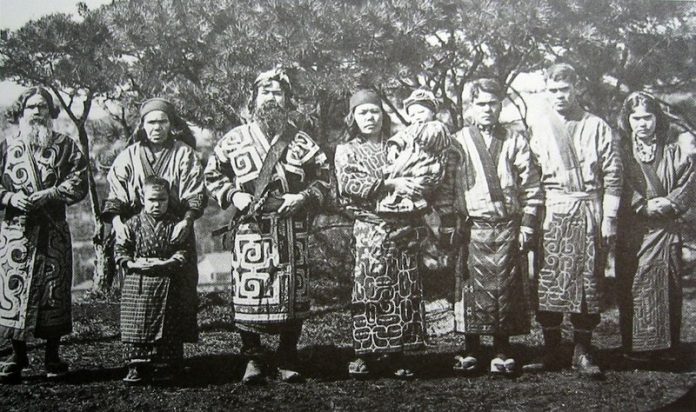
Another 28/02/20 the Most severe punishment among the peoples of the far North
Many peoples of the North are ethnic relics whose history goes back to time immemorial. Their national customs, sometimes violent, are the echoes of the events of distant times. For example, the degree of the severity of punishment for the same offense in different Northern ethnic groups could be very different.
Punishment for stealing
The Ulchi theft of small fur-bearing animal from the trap was punished even more serious than the theft of a valuable animal, as it was believed that the crime committed not out of a desire to earn income, and of evil intentions.
the Ainu were punished for theft is very severe: they cut the tendons in the feet, cut off noses and ears. The Amateur catch to profit from other people’s nets could omit the ice.
the Itelmen thieves-“recidivists” were hand wrapped with birch bark and burned it.
the Orochi the propensity to theft was considered a sign that the person is possessed by an evil spirit. The perpetrator was framed under the nose of a bundle of smoldering rosemary and beat until it is not out evil spirit (Larkin V. G.). Flogging was not provided for a certain number of beats, and bringing the person to a certain condition. Ewenki thieves seconds to four of fainting.
Vasyugan Khanty put on the offending high birch-bark hat and drove through the village, however, he had to beat in the boiler.
a Serious immoral act has been stealing property from the house (from the plague). The very presence on foreign soil meant the credibility of the guest, to deceive which was unacceptable. “Why my stuff was taken? Believed me dead?” – that is, the thief didn’t just take someone else, but self-fulfilling prophecy on the host. Dishonor in such cases fell on the whole family of the thief, and even of his ancestors, and this could have serious consequences for the whole family.
the Effect of moral conviction was very strong. Known cases when Nivkh, convicted of immoral acts, went into the forest and ended Wthe life suicide. (V. A. Sibarov, “Justice in the small peoples of the North”). The culprit blamed by the whole society, were sentenced to public repentance and compensation, slapped, flogged with rods or inflicted disfiguring wounds. Of Tofalars guilty h public: men, usually naked, women were left shirt. Punished, however, not particularly worried about the incident, then sat down with everyone else and participated in the General conversation. The Chukchi culprit was made to kneel and beaten on the head with a stick to which was attached a piece of deer antler.
a Common punishment was tying a person for one day to the wood, all passing by spit on him and said everything he thought about his behavior.
But hungry had the right to take food without asking, and no punishment for this he was not entitled. And the poor man could with impunity, steal from the rich man one or two deer.
property damage is often offset by the ransom. For example, the Ostyak was a case of theft killed a bear. The suspect was subjected to a triple oath on sacred subjects: the fire (charcoal), water and a bear’s head. In the third stage, people could not stand the psychological pressure and confessed to the theft and the attempt to deceive the elder. He was ordered to return the stolen and three times to throw a net and to give the prey the shaman for sacrifice.
After the submission of the Russian ransom for the stolen were made including vodka. For the murder of another deer was required to reimburse the cost to return his skin and give you a bottle of vodka, which together drank the claimant, the offender and the judge. The cost of the deer was determined by its quality: male and actually female, trained or not.
Severe punishment was expulsion from their environment: it was tantamount to a death sentence. The case when the Tungus, married a second time, in favor of the second wife left in the tundra, his daughter from his first marriage. In the hungry period in the tundra has left the adoptees, the sick and the afflicted.
After the arrival of the Russians this kind Kara lost relevance: outcast just went to a Russian village or in jail, where he willingly took on the service.
the Successful theft of out sort welcome. The losers were flogged, but not for theft but for failing. Stealing from the Russian, Komi and Swedes were, from the point of view of the Saami, praiseworthy. But the Khanty, Nenets and Itelmen Russian was equal to his own, so stealing from them is considered reprehensible (S. P. Krasheninnikov).
Punishment for sexual misdemeanors
the majority of the peoples of the North extramarital Affairs in contrast to the infertility problem were not considered (a relic of group marriage). Infertile women were recursively to obesity, with the result that they had died.
But the hunt slutty wives flogged to such an extent that they were not able to leave the place of execution. Men for adultery dressed in ugly clothes and drove yurts for General derision.
the Ainu for adultery practiced hanging by the hair and caning. Later popular was another method of punishment: the husband caused an opponent to a duel – three rounds of three strokes with a stick on the bare back, plus the ransom, after which the incident was considered exhausted.
the Nenets husband wife izmeniti silently approached the team of opponents otpahal it a single deer. The Sakhalin Nivkh, Evenk and Nanai unfaithful wife threw one in the tundra.
the Rapists tied up and flogged collectively: much as you wish. But in the case of girls quite often it was limited to dowry and the marriage. Used and herken: a man at night standing tied to the poles near the plague of the smoke of the fire, and he was forced to breathe the acrid smoke.
Punishment for murder
Killing the old and infirm family member as a crime not classified: elderly people have not had the opportunity to live life to the full, was a burden for the family, and we had to help him to revive again young and strong.
the Killing of a full-fledged member of the family of outsiders demanded blood revenge. Ucagiry looked at it as a shedding of the blood of his ancestor, which may fade the sun. At Ulchi killer had to give the family of the murdered his own son. The Ainu people of murderers alive buried in the ground.
At Nanai for the murder was supposed to give the sister, and if it were not, then the ransom, which necessarily included a chain mail (L. Y. Sternberg. 1939)
Especially the guilty were chained to the deck that the man was himself, I could not even feed himself.
a Murder inside the kind of all Nations with the exception of the Chukchi was punished by death or exile. Chukchi the massacre of members of the family remained without consequences, if it was committed by a man. The case when the head of the family killed his two wives with children and nephew, and received no retaliation. Intoxication was considered a mitigating circumstance because the person has committed a crime not through malice, but because of aberration of mind.
violations of taboos
According to the custom of the Tungus, the foreigner, who came to the tent of a sick man, was accused of his death and subject to killing on the principle of blood revenge. But it was possible to arrange the ransom, because the system was not so much a punitive nature, but also assumed the obligation to make amends and to mitigate the damage.
Water, fire, shelter and cooking utensils were sacred among the peoples of the North. It was forbidden to urinate on the coals. The Orochi was punished for tipped a bucket of water and damage to the fence of the hearth. The Nenets for a bowel movement in someone else’s tent. It was forbidden to prey on young and pregnant animals.
Military tradition
the Chukchi for centuries was the real terror of the Arctic and kept at Bay eskimo, Koryak and Yukagir. Chuukese warriors had bone armor, excellent shot from a bow and went into battle under the roar of drums covered with human skin. Often their raids wore the territorial nature: Asia vs America. A particularly valuable prey was considered black women: for them, the flotilla of canoes Chukchi came to Canada.
the Chukchi had used torture against the captured leaders and military commanders. The person was stripped and tied to a tree: in winter it was freezing, and in summer, eaten alive by the Midge: these insects do not just drink blood like mosquitoes and bite off the flesh. The prisoner also could burn, sit on hot coals.
the Eskimos Chukchi paid full reciprocity. They executed the prisoners, drilling their skulls.
the Koryak and Chukchi women wore a knife, which in the case of military defeat killed their children and committed suicide to avoid slavery.
the Koryaks developed in children reaction to danger: he was stalking the kid and burned him with a hot or sharp object. As a result, children get used to instantly bounce at the slightest strange movement or sound. The success of grafted skills were verified by testing the father to send the child anywhere with an assignment, and he walked after him and, seizing the moment, shot at the son of Luke. If he did not have time to react, it fell dead.
the peoples of the North, it was believed that even if the bad act of a person becomes public, the spirits still punish the guilty. This will make on behalf of the Supreme deity, the spirit of a bear. The deceased in the accident is considered as a perjurer or the perpetrator of balance in the universe. If someone was attacked by a bear, he was automatically convicted in all the previous litigation. If he remained alive, he had to repent and pay the opponent’s court compensation, regardless of the remoteness of litigation.
Galina Pogodina
Source:
© Russian Seven
Featured articles Share: Comments Comments on the article “the Most severe punishment among the peoples of the far North” Please log in to leave a comment! br>
Share on Tumblr
















